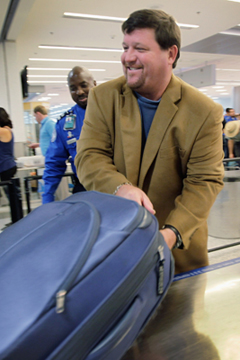
Ben Starrett places his bag on the table for security screening as he uses the new TSA PreCheck lane at Miami International Airport
When the TSA began a limited version of its PreCheck initiative — which allows a small proportion of air travelers to speed through the screening process without having to remove shoes, jackets or laptops from bags — the agency called it a “voluntary” passenger pre-screening program. But in the same press release, dated Oct. 4, the TSA also said this:
Eligible participants include certain frequent flyers from American Airlines and Delta Air Lines as well as members of the Customs and Border Protection’s (CBP’s) Trusted Traveler programs, including Global Entry, SENTRI, and NEXUS, who are U.S. citizens and are flying on participating airlines.
PHOTOS: The 2011 Paris Air Show
So, yes, it’s a voluntary program, assuming that the TSA statement is correct, and those who volunteer to take part in PreCheck must first disclose some sort of personal information about themselves. But the pool from which these volunteers are being drawn is still a decidedly small one. Maybe even 1% small. That’s the argument — borrowed from the Occupy Wall Street message lamenting the disproportionate wealth of 1% of Americans — being made in recent columns circulating on the Internet. And it may very well be true.
If frequent fliers, who are very often business professionals, are the main ones to participate in the TSA PreCheck program, then there’s a pretty high likelihood that the 1% are the ones afforded a less stressful screening process. It also means that the rest of us — say, the 99% — are getting the same old checkpoint treatment. Not exactly fair, but the air-travel industry has long catered to those who spend more time and money flying. The rest of us will just have to wait until we’ve either racked up enough miles to become elite fliers or the TSA opens up the program to just anyone who wants to volunteer for it.






